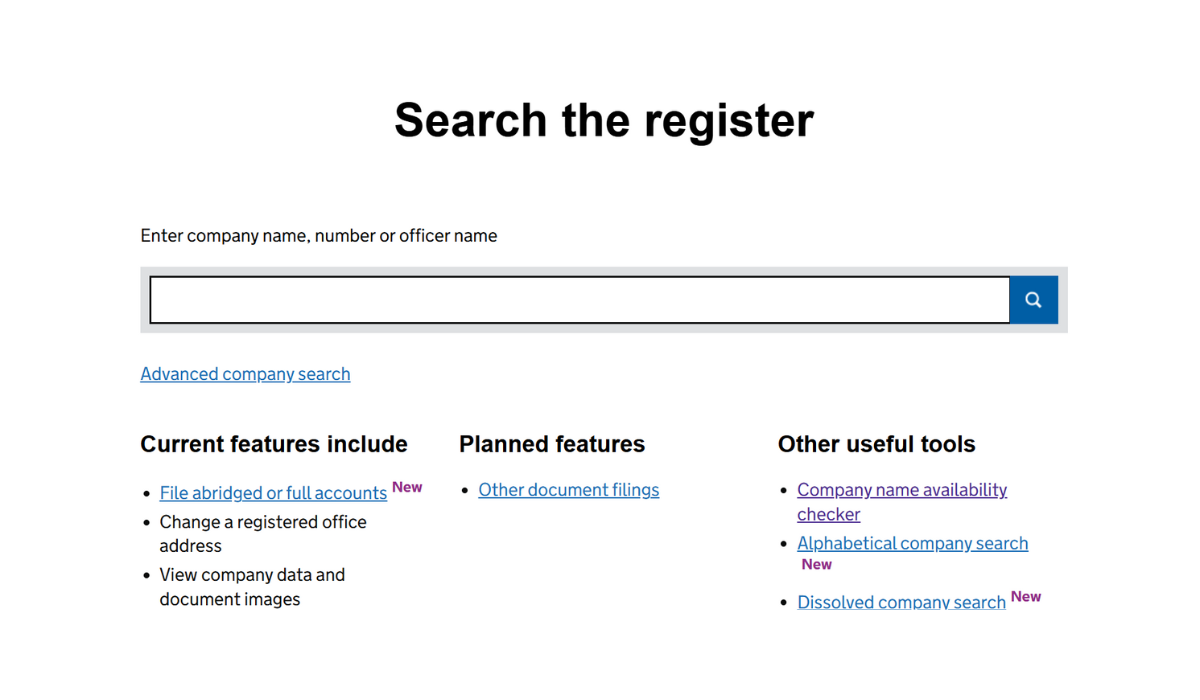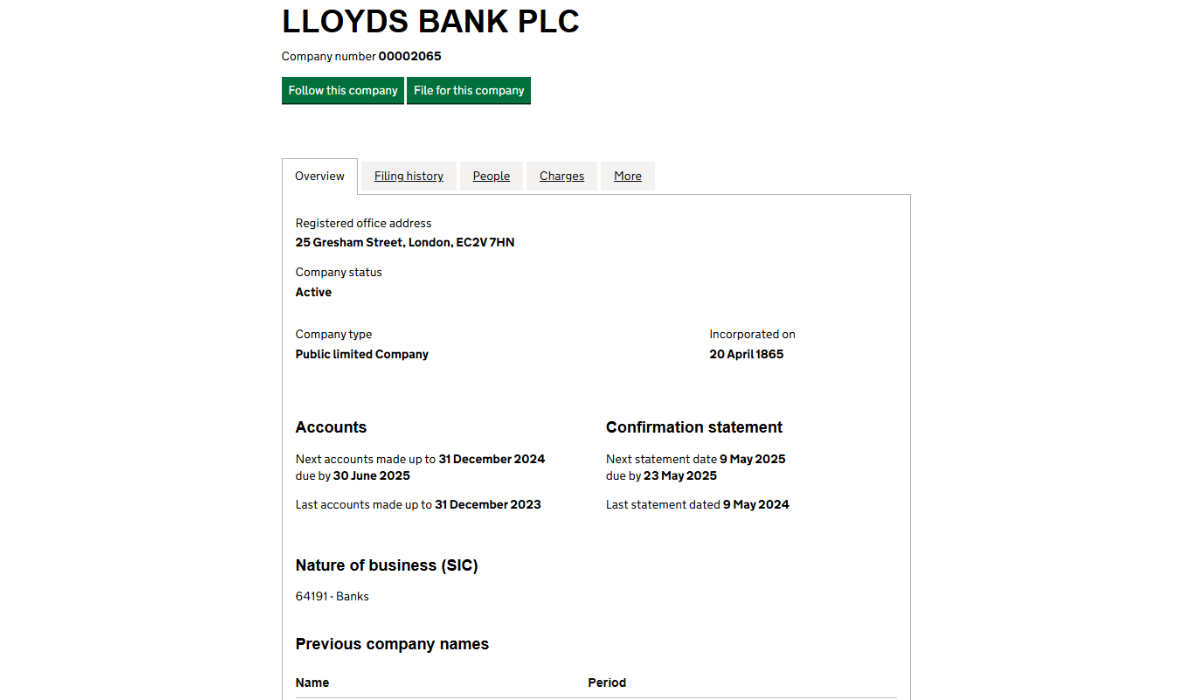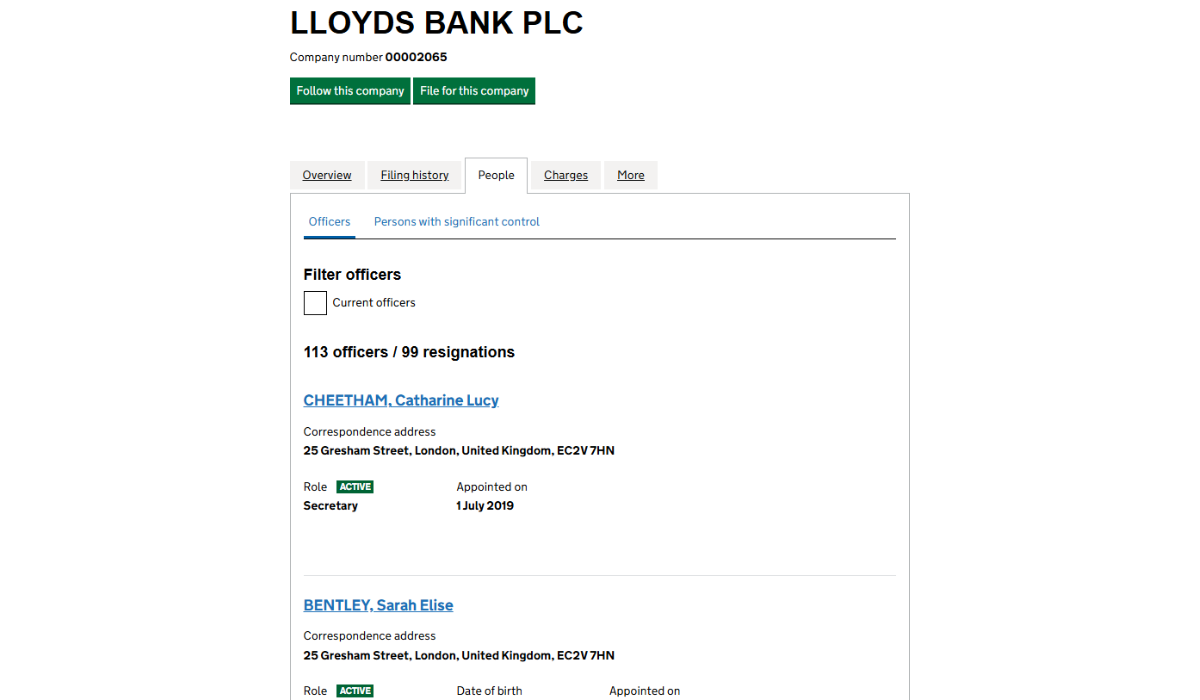
When researching a business, Companies House is the primary source of official company information in the UK. In this guide, we’ll explain how to use a Companies House search, what kind of data is available, and how to interpret company profiles.
What data can you check using Companies House?
A Companies House search offers detailed insights into registered businesses, including:
Company status: Whether a business is active, dissolved, or in administration.
Incorporation date: The date a business was officially formed, plus you can also check the memorandum and articles of association.
Registered office address: The official address for correspondence.
Company accounts: Annual financial statements, including balance sheets and profit and loss summaries.
Filing history: A list of documents filed, such as changes to directors or share capital.
Directors and officers: Names and roles of individuals involved in managing the company.
Shareholders and share capital: Information about the company’s ownership structure.
Mortgages and charges: Details of secured loans or other financial obligations.
These details provide transparency, helping you assess a company’s financial health, legal standing, and leadership.
How up-to-date is the data?
Companies House data is generally reliable, but its timeliness depends on when companies submit their required filings.
Annual accounts are due within nine months of the financial year-end.
Confirmation statements (which confirm the accuracy of a company’s records) are required annually.
Changes to directors or registered addresses must be reported promptly.
While Companies House aims to keep data as current as possible, it may not reflect very recent changes. For critical business decisions, additional research and professional advice are always recommended.
💡Editor's insight: "Also keep in mind that Companies House says it “does not verify accuracy of information filed”. So there's always a chance that incorrect information within filing data can be uploaded."
What types of businesses can you find on Companies House?
Companies House holds records for various types of UK businesses, including:
Private limited companies (Ltd): The most common type of business in the UK.
Public limited companies (PLC): Companies that can sell shares to the public.
Limited liability partnerships (LLP): A hybrid structure combining partnership flexibility with limited liability.
Community interest companies (CICs): Organisations set up for social enterprise.
Companies limited by guarantee: Often used by non-profits and charities.
However, sole traders and unincorporated partnerships are not listed on Companies House, as they are not separate legal entities.
What do Companies House company profiles include?
When conducting a Companies House search, you’ll gain access to a range of essential details about a company. These profiles are comprehensive records designed to provide transparency about businesses operating in the UK. Understanding what these profiles contain is key to making informed business decisions. Here’s a closer look at each section:

1. Company Overview
The overview section provides a snapshot of the company’s basic identifying information:
Company name and registration number: Unique identifiers for official reference.
Incorporation date: The date the business was legally formed.
Company type: Specifies whether the business is a private limited company (Ltd), a public limited company (PLC), or another structure.
Registered office address: The official address used for legal correspondence, which may differ from the actual trading location.
Company status: Indicates if the business is active, dormant, dissolved, or in liquidation.
This information helps you quickly establish whether the company is operational and where it is legally registered.
💡Editor's insight: "A good thing to remember is that the date that a business is added to the register isn’t necessarily the date that it started trading. Sometimes founders like to ‘reserve’ a company name months or even years before they start trading!"

2. Filing History
The filing history lists all documents submitted to Companies House, offering insights into the company’s operational timeline and key events. Some common filings include:
Annual accounts: Financial reports that provide a summary of income, expenses, assets, and liabilities.
Confirmation statements: A yearly update confirming that all company details on record are accurate.
Director appointments and resignations: Records of when individuals joined or left the board of directors.
Changes to share capital: Updates on the number of shares issued or changes to shareholders’ rights.
Mortgage or charge registrations: Details of loans or securities placed against company assets.
Each entry includes a filing date, a brief description, and often a downloadable PDF of the original document. This helps you assess the financial health, structure, and governance history of the business.
3. People and Officers
The People section shows current and previous directors, company secretaries, and sometimes significant controllers:
Director names: Individuals responsible for managing the company’s affairs.
Appointed and resignation dates: The timeline of a director’s involvement.
Correspondence addresses: Often the registered office, though directors can use a service address to protect their home address.
Date of birth (partial): Typically shows only the month and year to safeguard privacy.
This section is valuable for assessing who is behind a company and tracking their business involvement across multiple organisations.

4. Shareholders and Share Capital
For companies limited by shares, profiles may include:
Number of shares issued: Represents the ownership division of the company.
Shareholders’ details: Names of major shareholders in some cases.
Types of shares: Ordinary shares or others with specific rights (e.g., preference shares).
Nominal value per share: The base value assigned to shares, which may differ from market value.
This data helps you understand the ownership structure and investment stakes.
5. Registered Charges and Mortgages
Companies House profiles also provide records of charges, which refer to financial agreements secured against a company’s assets:
Date of creation and satisfaction (if paid off).
Chargeholder: The entity providing the loan or financial facility.
Description of assets: Properties or equipment used as collateral.
Reviewing charges can reveal financial commitments and potential risks tied to a company’s assets.
Companies House people profiles explained
People profiles on Companies House offer insights into individuals connected with companies. These profiles can include:
Director roles: A list of companies where the individual serves as a director or officer.
Appointed and termination dates: Information about when a person was appointed or resigned.
Disqualifications: In cases where a director has been disqualified, the profile will reflect this status.
This data helps you understand the business interests and track records of key individuals within a company.
Other Companies House services
In addition to company and people searches, Companies House offers:
Company name availability checks: To see if a proposed business name is already registered.
Document downloads: Many filings, such as accounts and confirmation statements, are
available for free download.
Company authentication: If you’re a business owner, you can use Companies House to file updates and meet statutory obligations.
These tools are invaluable for anyone looking to research or manage business information efficiently.
FAQs
How do I search for a company on Companies House?
Visit the Companies House website and use the free search tool by entering a company name or registration number.
Is Companies House data always accurate?
Companies House relies on self-reporting from businesses. While most data is accurate, it’s important to cross-reference critical information with other sources.
Can I access historical company data?
Yes, the filing history includes records of past accounts, director changes, and other key events.
Final thoughts
Companies House can be a powerful resource for researching businesses in the UK. Whether you’re conducting due diligence, checking a potential partner, or simply staying informed, using a Companies House search can give you the clarity you need. Understanding Companies House data and knowing how to interpret company profiles helps you make smarter, more informed decisions.